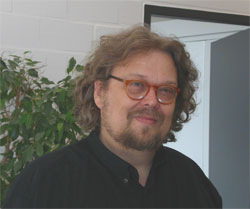
|
Prof. Dr. Hans Dobbertin, 1952-2006 |
We are all saddened by the death of our great fellow cryptographer Hans Dobbertin. He was born at 17th April 1952 in Herkensen in the North of Germany. He obtained his doctoral degree in 1983 with Prof. Marcel Erné and his habilitation in mathematics in 1986 at the University of Hanover where he became an “Außerordentlicher Professor”. His interest in cryptography was ignited after taking a position at the BSI, the German federal agency of IT security.
In the mid 1990s, when working at the BSI, Hans Dobbertin made substantial contributions to the area of hash functions. He introduced a complete new set of tools to cryptanalyze hash functions of the MD4 family, which combined differential cryptanalysis with simulated annealing, genetic algorithms, and continuous approximations. This allowed him to find collisions for MD4, collisions for the compression function of MD5 and extended MD4, 2nd preimages for a 2-round reduced version of MD4, and collisions for 2-round reduced version of RIPEMD. He also made important contributions to the constructive side of cryptographic functions. He was a co-designer of the RIPEMD-160 hash function, which is a substantially strengthened version of RIPEMD.
Hans Dobbertin also made major progress in the area of maximally nonlinear functions. In particular in the Summer of 1998, when visiting the COSIC group at K.U. Leuven in Belgium, he finalized the proof of the 30 year old Welch conjecture (in joint work with Anne Canteaut and Pascale Charpin of INRIA), which states that for any odd integer n, where n=2m+1, the power function x d with d=2m+3 is maximally nonlinear in GF(2 n ). This is another major result that illustrates his extraordinary mathematical talent.
After a short period as professor at the University of Klagenfurt in Austria, he assumed a chaired professorship at the University of Bochum, Germany, in 2001. He became founding director of the Horst Görtz Institute (HGI) for IT Security, one of the largest cryptography and IT security research institutions in Europe. In addition to establishing the HGI, he advised three very successful Ph.D. theses and continued to make important contributions to the field of Boolean functions. Hans fell suddenly ill in the late spring of 2005 and left us on February 2, 2006.
Hans was a very generous researcher, who was always ready to share his clever insights and novel ideas with his colleagues. As a mathematician, he combined a strong intuition with excellent technical skills and an ability to combine several approaches in a creative way to tackle a problem. As a colleague and friend, he was always liked because of his unconventional way of thinking and his generosity. We will miss him.
Christof Paar (Ruhr-Universität Bochum)
Bart Preneel (Katholieke Universiteit
Leuven)